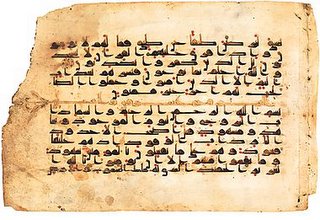What is the Koran ?

Researchers with a variety of academic and theological interests are proposing controversial theories about the Koran and Islamic history, and are striving to reinterpret Islam for the modern world. This is, as one scholar puts it, a "sensitive business" . IN 1972, during the restoration of the Great Mosque of Sana'a, in Yemen, laborers working in a loft between the structure's inner and outer roofs stumbled across a remarkable gravesite, although they did not realize it at the time. Their ignorance was excusable: mosques do not normally house graves, and this site contained no tombstones, no human remains, no funereal jewelry. It contained nothing more, in fact, than an unappealing mash of old parchment and paper documents -- damaged books and individual pages of Arabic text, fused together by centuries of rain and dampness, gnawed into over the years by rats and insects. Intent on completing the task at hand, the laborers gathered up the manuscripts, pressed them into some twenty potato sacks, and set them aside on the staircase of one of the mosque's minarets, where they were locked away -- and where they would probably have been forgotten once again, were it not for Qadhi Isma'il al-Akwa', then the president of the Yemeni Antiquities Authority, who realized the potential importance of the find.
Al-Akwa' sought international assistance in examining and preserving the fragments, and in 1979 managed to interest a visiting German scholar, who in turn persuaded the German government to organize and fund a restoration project. Soon after the project began, it became clear that the hoard was a fabulous example of what is sometimes referred to as a "paper grave" -- in this case the resting place for, among other things, tens of thousands of fragments from close to a thousand different parchment codices of the Koran, the Muslim holy scripture. In some pious Muslim circles it is held that worn-out or damaged copies of the Koran must be removed from circulation; hence the idea of a grave, which both preserves the sanctity of the texts being laid to rest and ensures that only complete and unblemished editions of the scripture will be read.

A page from perhaps the world's
oldest extant Koran, from before
750 A.D. Ultraviolet light reveals
even earlier Koranic writing
underneath. Photograph by
Gerd-R. Puin.
Some of the parchment pages in the Yemeni hoard seemed to date back to the seventh and eighth centuries A.D., or Islam's first two centuries -- they were fragments, in other words, of perhaps the oldest Korans in existence. What's more, some of these fragments revealed small but intriguing aberrations from the standard Koranic text. Such aberrations, though not surprising to textual historians, are troublingly at odds with the orthodox Muslim belief that the Koran as it has reached us today is quite simply the perfect, timeless, and unchanging Word of God.

From the Yemeni Hoard: probably a ninth- or tenth-century Koran. Photograph by Gerd-R. Puin.
The mainly secular effort to reinterpret the Koran -- in part based on textual evidence such as that provided by the Yemeni fragments -- is disturbing and offensive to many Muslims, just as attempts to reinterpret the Bible and the life of Jesus are disturbing and offensive to many conservative Christians. Nevertheless, there are scholars, Muslims among them, who feel that such an effort, which amounts essentially to placing the Koran in history, will provide fuel for an Islamic revival of sorts -- a reappropriation of tradition, a going forward by looking back. Thus far confined to scholarly argument, this sort of thinking can be nonetheless very powerful and -- as the histories of the Renaissance and the Reformation demonstrate -- can lead to major social change. The Koran, after all, is currently the world's most ideologically influential text. In full.......

Comments